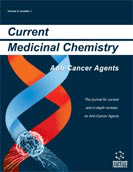Abstract
Treatment of cancer using nanoparticle-based approaches being explored extensively to overcome the drawbacks associated with conventional treatment. Progress in nanotechnology for cancer therapy has led to the development of smart nanoformulations which improve the intracellular delivery of drugs due to their augmented multi-functionality and targeting potential. Smart nanoformulations are nano range particles which release the drug in accordance with the biological stimuli pre-existing at the disease site. This chapter summarizes most of the recent patents related to smart nanopreparations for cancer therapy. Such a smart system has shown to enhance the therapeutic effect of current standard treatment modalities such as chemotherapies and radiotherapies. Several polymeric nanoparticles were patented that destroy tumors by thermal energy deposition and thus enhanced tumor therapy. Patented thermoresponsive solid lipid nanoformulations which act as smart drug delivery systems showed temperature sensitivity (39°C-45°C) and release payload at target sites of cancerous cells. The pH-sensitive polymeric drug delivery system containing adornment acidic or basic groups to accept or donate protons in response to environmental pH showed accelerated drug release at the tumor site. A novel liposome linked thermosensitive peptide was invented which showed temperature dependent peptide shrinkage and drug release. Likewise, due to unique properties of metallic nanoparticles in imaging and diagnostic field, they are gaining interest widely as stimuli-sensitive drug delivery system. Gold nanoparticles can absorb light strongly and convert photon energy into heat quickly and efficiently escalating the temperature of a tumor cell (41°C-47°C) and thus destroying cancerous cells specifically. Coupling metallic nanoparticle properties with pH-sensitive targeting, resulted in an enhanced anti-tumor effect as observed in recently granted patents.
Keywords: Cancer, carbon nanotubes, controlled release, dendrimers, gold nanoparticles, hydrogels, ligand, liposomes, magnetic nanoparticles, metallic nanoparticles, micelles, nanoformulation, nanotechnology, pH-sensitive targeting, polymeric nanoparticles, smart nanoformulation, solid lipid nanoparticles, stimuli-sensitive, thermosensitive nanoparticles, virus-based nanoparticles.






















